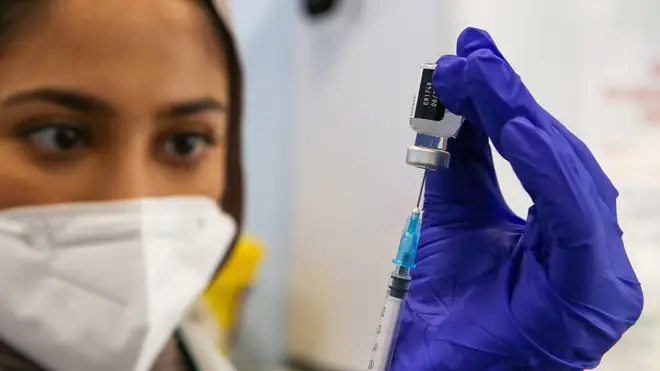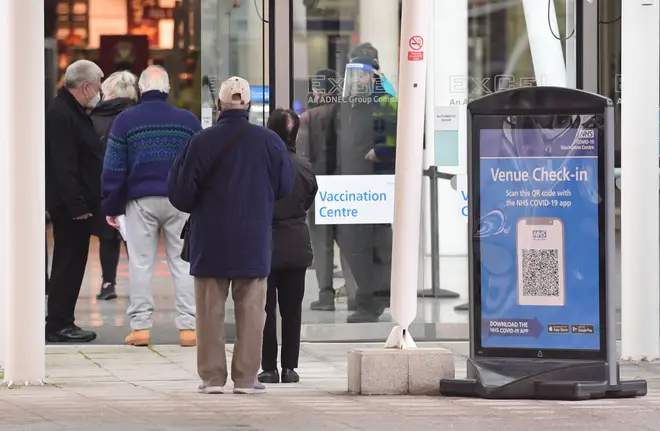
Iain Dale 7pm - 10pm
30 April 2021, 13:30 | Updated: 30 April 2021, 19:13

Real-world data from the UK compiled by Sage experts suggests Covid vaccines work at cutting hospital admissions dramatically after only one dose.
The jabs have led to only a "tiny" number of people being admitted to hospital 21 days after their injection, new data shows.
However, the Scientific Advisory Group for Emergencies (Sage) document released on Friday also warned that vaccines may fail to stop admissions among a very small number of people, particularly the frail and elderly.
There are also suggestions some got infected with Covid-19 after mistakenly thinking they had immunity after their dose, when their bodies instead needed more time to develop protection.

Dr Chris Smith says that foreign travel is still risky as the UK opens
The findings are based on data from more than 52,000 patients who were taken to hospital between December 8, when the UK's vaccination programme began, and April 10.
The positive data comes as the ONS found every country in the UK was seeing a decline of Covid infections in private households.
Sage member Calum Semple, professor in child health and outbreak medicine at the University of Liverpool, who co-led the study, said the analysis gives Sage an early look at whether vaccines work in the real world.
Read more: Vaccine rollout extended to all over-40s in England
Read more: Quarter of UK adults have now received two doses of coronavirus vaccine

JVT answers Ben Kentish questions on Covid vaccines and variants
"The absolute numbers of people being admitted to hospital after 21 days of the first dose is tiny," he said.
"It is very small, but it does occur - it is mostly occurring in the group most at risk of severe disease, which is the elderly people (and) people (who) are very frail and very old.
"This is good real world evidence of it working, but there are some few failures.
Read more: UK secures 60 million extra Pfizer doses for autumn booster programme
Read more: Over half of UK adult population has now had at least one Covid-19 vaccine
"And when these failures do occur, sadly, people die, but that is because they are elderly and frail."
The study found that of the 52,280 patients looked at, 3,598 had data showing they had been given a vaccine jab.
A total of 526 people who tested positive for Covid-19 were admitted to hospital more than 21 days after their first dose - when vaccines are usually expected to provide some level of protection - with 113 dying.

Dr Annemarie Docherty, an honorary consultant in critical care at the University of Edinburgh, and study co-author, said: "Our take home messages are that this is some real world data, which does show some vaccine failure, but this is not unexpected, and reflects what the (clinical) trials have shown."
Dr Docherty also suggested vaccine failure could be "under represented" because cases have been driven down by lockdown, resulting in less opportunity to get infected.
The study also only reflects how vaccines worked in patients admitted to hospital and does not show their effectiveness in the community.
However, Prof Semple suggested some of the infections happened before patients were fully protected, and may have happened because some have "let their guard down".
Most of the 3,598 vaccinated patients who were were admitted to hospital went in within 15 days of their dose, getting infected before developing immunity.
It is thought three weeks are needed to build up maximum immunity after a single jab.

Matt Hancock receives his first coronavirus vaccine
Researchers thought the elderly and vulnerable patients who had received a jab could have been infected by coronavirus after mistakenly thinking they had become immune.
Prof Semple said: "Many people are acquiring Covid within two weeks of being vaccinated, which does indicate that people are letting their guard down.
"There is evidence here that people are, unfortunately, assuming that they are protected very quickly after vaccination and that is not the case."
Reacting to the analysis, Deborah Dunn-Walters, Professor of Immunology at the University of Surrey and Chair of the British Society for Immunology COVID-19 taskforce, said: "According to this paper, the majority of hospitalisations for COVID-19 post-vaccination take place in this 1-14 day window when protection from the vaccine is not yet fully active.
"This shows the importance of maintaining social distancing, even after vaccination, to minimise the risk of contracting SARS-CoV-2 before your immune protection is active."
Vaccines are considered the only route out of the pandemic, allowing populations to build up protection against them, and recent studies have also shown they cut transmission of Covid-19 between people.
They are also overwhelmingly safe, experts have repeatedly stressed.
In the UK, more than 34 million first doses have been given out, and more than 14 million people have received their second - a quarter of the country's adults.
The Government is also looking into further booster shots later in the year, to guarantee ongoing protection.